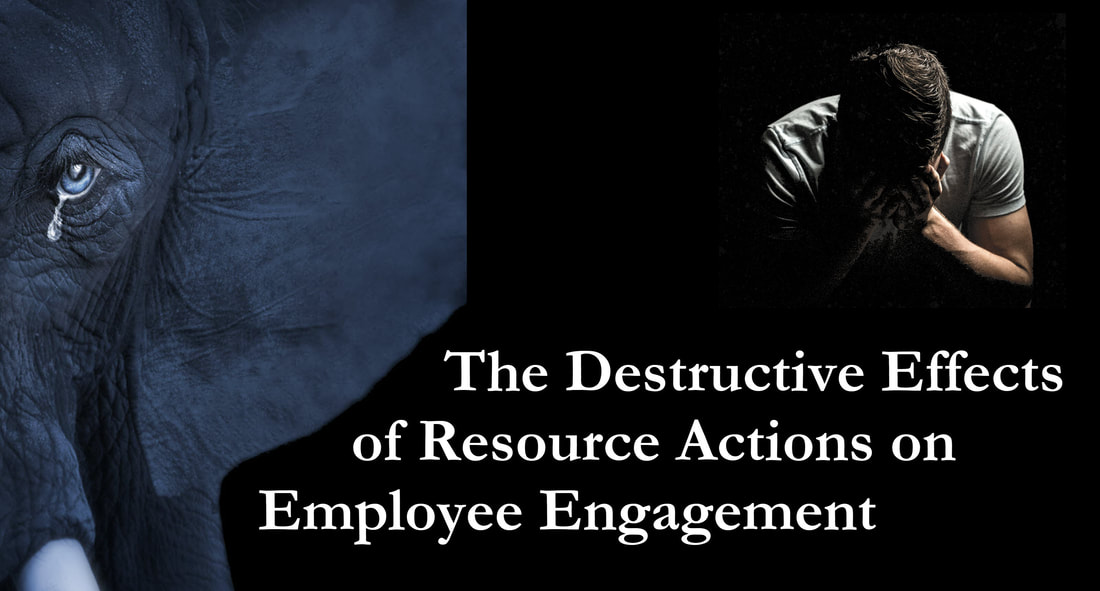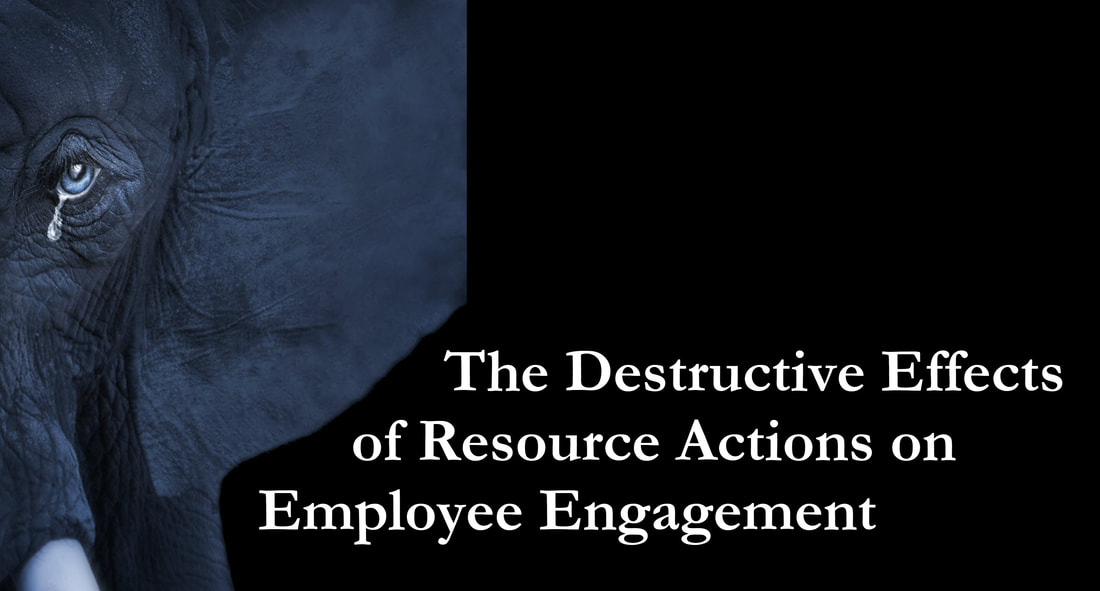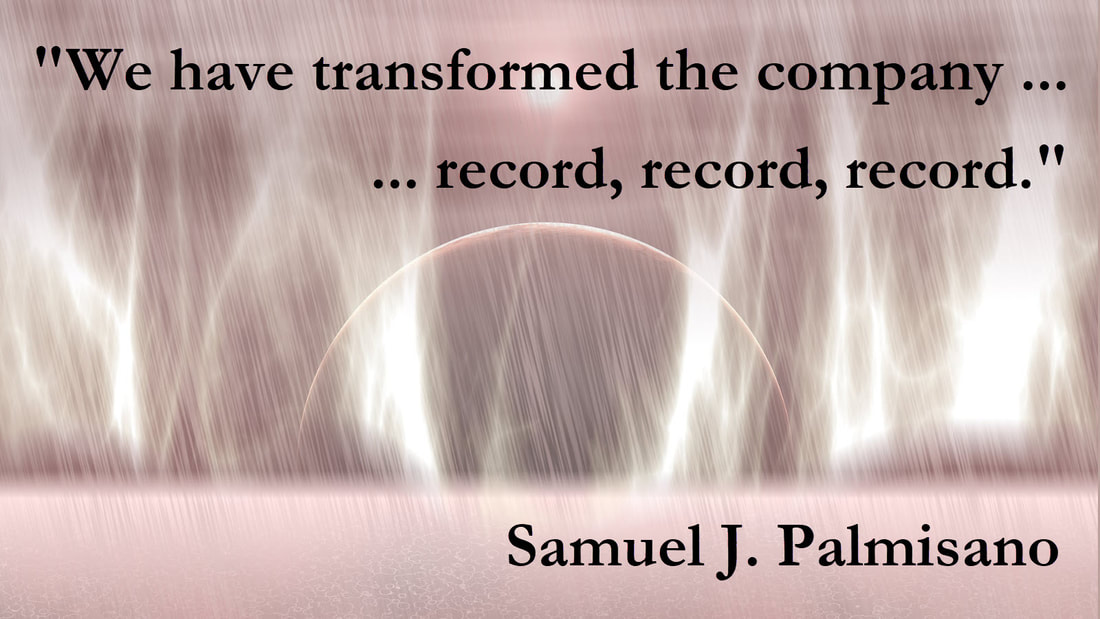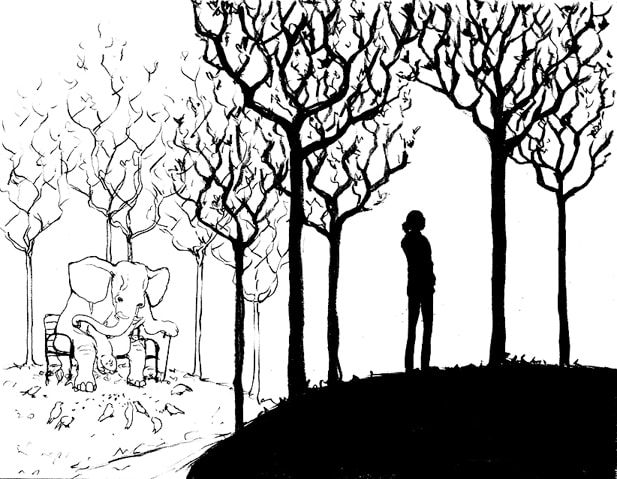How Resource Actions--Workforce Rebalancing--Affect Productivity
The New Corporate Carpe Diem
The resource actions never ended. Gerstner started them; Samuel J. Palmisano became addicted to them; Virginia M. Rometty, evidently, saw them as the only path to meeting her profitability metrics. Arvind Krishna and James M. Whitehurst are continuing the tradition.
|
Almost three decades of layoffs--resource actions
|
For the individual, resource actions are water torture, and for a corporate social ecology they are waterboarding. When in process, they are suffocating. They touch moms and dads, aunts and uncles, brothers and sisters.
These elephants are a family affair, and they touch us everywhere—sometimes it is distant; sometimes it is close; sometimes it is on your doorstep. On January 21, 2009, I decided to capture one on paper.
|
The day began in the Jewish tradition—in the darkness of the night before. Our CEO sent an e-mail prologue, most likely as he left for home, family and friends.
Dear IBMer:
We have just issued our financial results for the fourth quarter and full year 2008. . . . Our 2008 results set several records: record revenue of $103.6 billion—the first time IBM has passed the $100 billion mark; record pre-tax earnings of $16.7 billion, up 15 percent from 2007; record earnings per share of $8.93; and record free cash flow of $14.3 billion. [Emphasis added.]
Dear IBMer:
We have just issued our financial results for the fourth quarter and full year 2008. . . . Our 2008 results set several records: record revenue of $103.6 billion—the first time IBM has passed the $100 billion mark; record pre-tax earnings of $16.7 billion, up 15 percent from 2007; record earnings per share of $8.93; and record free cash flow of $14.3 billion. [Emphasis added.]
Sam Palmisano, Chairman, President and Chief Executive Officer
|
With the rising sun, his words again celebrated the previous year’s financial results on our intranet home page: “We transformed the IBM Company and you can see it in our financial performance. . . . If we hadn’t there is no way ’08 would have been record, record, record.” [Emphasis added.]
But few of us cared, because within the next twelve hours a large number of us—the whisper number was seventeen thousand—would receive career-ending pink slips. |
Most of us in Software Group really didn't care
|
So we feared a different kind of record—being one among the largest number of employees resourced in a single day in IBM’s most profitable division.
My closest friends were reaching out by breakfast.
David was first. Where he lived it was 7:30 a.m. He was on the technical team that supported me. It was a short instant message: “I got hit by the latest resource action.” I asked for his résumé. When I called a manager—a personal friend—he apologized: “Human Resources told me that if I fill my open position with a person from the resource action I’ll have to ‘ante up’ a replacement from my own team. Pete, I can’t do that.” (That afternoon, an IBM spokesperson told the Austin press, “Some employees could find other positions within IBM and we’re enabling them in that effort.” Apparently a spokesperson’s “some could” should be translated to “none will.”)
Helen was next. We were teammates. She and I had traveled the world together. Every country we entered, she looked for presents for my wife—pashminas in China, pewter in Malaysia and Bidriware in India. Her father had died recently, and she moved her mom near her. We always compared notes and laughed over the day-to-day problems of the sandwich generation—caring for young children and aging parents at the same time. She was, like so many women today, balancing the duties of wife, mother and daughter-caretaker. Sadness set in as I felt that I was losing the best of friends and remembered a bygone era that had seen me through such life events.
Roger was on our team, too. I had recommended he join it. I now regretted that advice. I learned that HR’s lightning could scorch the same place twice.
Terry was a friend of twenty years. He was told to retire, though he still had a son to put through college. In January 1993 he had found a job for me—a move to brand management. It breathed new life into my IBM career. He sought me out then, but I couldn’t help him now. I felt powerless, embarrassed and full of guilt.
The Linux worldwide sales team was disbanded. Many of my closest and oldest friends were there. If there was any group of IBMers that had epitomized a nineties Gerstner Guerilla team, it was us—we found seven more years of revenue for IBM’s largest and best OS/2 banking customers. IBM’s Linux strategy lost some amazing expertise. Strategies stumble in the face of an earnings-per-share road map.
My closest friends were reaching out by breakfast.
David was first. Where he lived it was 7:30 a.m. He was on the technical team that supported me. It was a short instant message: “I got hit by the latest resource action.” I asked for his résumé. When I called a manager—a personal friend—he apologized: “Human Resources told me that if I fill my open position with a person from the resource action I’ll have to ‘ante up’ a replacement from my own team. Pete, I can’t do that.” (That afternoon, an IBM spokesperson told the Austin press, “Some employees could find other positions within IBM and we’re enabling them in that effort.” Apparently a spokesperson’s “some could” should be translated to “none will.”)
Helen was next. We were teammates. She and I had traveled the world together. Every country we entered, she looked for presents for my wife—pashminas in China, pewter in Malaysia and Bidriware in India. Her father had died recently, and she moved her mom near her. We always compared notes and laughed over the day-to-day problems of the sandwich generation—caring for young children and aging parents at the same time. She was, like so many women today, balancing the duties of wife, mother and daughter-caretaker. Sadness set in as I felt that I was losing the best of friends and remembered a bygone era that had seen me through such life events.
Roger was on our team, too. I had recommended he join it. I now regretted that advice. I learned that HR’s lightning could scorch the same place twice.
Terry was a friend of twenty years. He was told to retire, though he still had a son to put through college. In January 1993 he had found a job for me—a move to brand management. It breathed new life into my IBM career. He sought me out then, but I couldn’t help him now. I felt powerless, embarrassed and full of guilt.
The Linux worldwide sales team was disbanded. Many of my closest and oldest friends were there. If there was any group of IBMers that had epitomized a nineties Gerstner Guerilla team, it was us—we found seven more years of revenue for IBM’s largest and best OS/2 banking customers. IBM’s Linux strategy lost some amazing expertise. Strategies stumble in the face of an earnings-per-share road map.
|
The grapevine hummed
|
By mid-morning the more distant and more desperate called, and the internal grapevine pulsated with information. June coordinated sales and technical education. She made my job easier. She said that her whole team took horrible cuts. She was a sharp, conscientious and hard worker. This day reinforced cynicism—it was not about performance but wrong place, wrong time. The general business team was disbanded. They sold to small and medium businesses through IBM business partners. Nine months later, after a few beers, I would hear one person’s estimate that three-quarters of the organization was resourced—everybody but management. I would be told, “It has not been going well since.”
|
|
America’s Techline team—the software salesmen’s first line of support—was cut in half. Their mission changed because they were shorthanded. This sales process change meant fewer customer proposals, fewer presentations or escalations and more work for the individual sales representative. John was in product testing. Even though our software revenue grew by double digits, our testing department was decimated. Less regression testing meant customers would discover more problems while in production. Katie and Samuel were product managers. An acquisition had brought them into IBM, and an R.A. Day jettisoned them. Two conflicting strategies fought each other, as expertise purchased at a premium was set adrift.
|
It was a worldwide affair
|
By lunch the statistics started to flow: the Raleigh press reported fourteen hundred jobs lost; the Austin press reported a thousand to fifteen hundred; and both promised more details with the evening news. I thought not. The news would remain off tonight.
After lunch, R.A. Day reached out for me.
The previous year, I had been a 1 performer, but in the last few weeks my appraisal had been dropped without explanation. Because of past experience, I believed I was receiving a personal message: “You’re on the resource action list.”
After lunch, R.A. Day reached out for me.
The previous year, I had been a 1 performer, but in the last few weeks my appraisal had been dropped without explanation. Because of past experience, I believed I was receiving a personal message: “You’re on the resource action list.”
|
Image drawn by my daughter entitled "The Call" after reading this article
|
As I left my desk, I wondered if every now-unanswered instant message had a person behind it who thought I didn’t care. Outside it was a warm, sunny day. I picked a spot under some oak trees in a small, quiet park. No matter what happened, I wanted to remember what was important. It wasn’t the end of the world; it just wasn’t the ending I had planned.
It meant that at fifty-five I would be starting down a new path. By now the cuts were so deep that the day’s futility and despair had sunk in across the organization. I knew I couldn’t even save myself. Brad, my manager, wasn’t on time. Our call was scheduled for 1:15, so I sent him an instant message. He dropped offline.
|
I wondered if it was him or my BlackBerry. If I was in his shoes right now, how could I call friends and give them the bad news?
At 1:30 my phone rang. When I answered, Brad immediately said, “This is a good call—you’re okay. I did my best to set up individual calls with everyone.”
Relieved, I asked Brad how he was holding up. Brad was a good man, and I could not imagine carrying his burden. I wanted to tell him it was okay. We all knew it wasn’t him doing this to us.
Relieved, I asked Brad how he was holding up. Brad was a good man, and I could not imagine carrying his burden. I wanted to tell him it was okay. We all knew it wasn’t him doing this to us.
|
“I’ve been resourced,” he said.
If there is hell on earth, I experienced it that day. I would eventually crawl into bed thanking God the day was done. As it began in the Jewish tradition, so it ended in the Celtic one, with a wake that everyone handled differently. The emotions ranged as wide as the number of people resourced: from cynicism to stoic acceptance, from fear to frustration, and from disappointment to even cheerfulness at starting a new life. This time, for me, it was anger at the two e-mails—callous epilogues—that arrived at dusk. |
I experienced hell on earth this day
|
The General Manager of Tivoli Software wrote:
"Perhaps the best part of a new year is the fresh start we get to refocus on our strategy and goals. . . . SWG revenues were up 11 percent in 2008 and up 3 percent in the fourth quarter (both at actual rates). Unfortunately, the Tivoli team struggled to reach our double-digit revenue growth goals throughout 2008. . . . I am proud to say that the team did a great job of reducing expenses--a continuing high priority for 2009." [Emphasis added.]
The Senior VP and Group Executive of IBM Software Group followed this closely with his expression of gratitude:
"You hit our profit plan for the year, an outstanding achievement that contributed significantly to IBM’s growth model. Despite a challenging economic environment, strong sales execution in 4Q helped achieve our best quarter of the year. And we gained market share, although we missed our full-year revenue plan. . . . In the quarter, we also did an excellent job controlling expenses. This will continue to be important in 2009 as we shift our investments to advance our growth strategy, deliver results to shareholders and emerge from this unprecedented environment even stronger." [Emphasis added.]
In the journal where I captured this day, I wrote, “We know they don’t care, but do they not think?”
In 1926, speaking at a Quarter Century Club meeting, Tom Watson Sr. had said:
Experience is a great teacher and in a highly technical business such as ours it is essential. The longer a man stays with a company the more valuable he should become, and I want to say to the twenty-five-year men that I consider the members of the Quarter Century Club one of the greatest assets our company possesses, because you know what should and should not be done.
I am an IBM Quarter Century Club member. As one of my company’s greatest assets and because I know what should and should not be done, what was done that day should never be done. It was ruthlessness in a time of corporate plenty.
Although the day’s pain passed, the mourning continued over the next month as silence replaced camaraderie with each friend’s departure. It continued over the next year, at worldwide sales events, as friends toasted friends “not present.”
But worst of all, until I found the courage to delete their names from my distribution lists, it arrived in the form of hundreds of automated e-mail replies that “This user is not listed in the Domino Directory.”
I feel guilty because I survived the slaughter.
"Perhaps the best part of a new year is the fresh start we get to refocus on our strategy and goals. . . . SWG revenues were up 11 percent in 2008 and up 3 percent in the fourth quarter (both at actual rates). Unfortunately, the Tivoli team struggled to reach our double-digit revenue growth goals throughout 2008. . . . I am proud to say that the team did a great job of reducing expenses--a continuing high priority for 2009." [Emphasis added.]
The Senior VP and Group Executive of IBM Software Group followed this closely with his expression of gratitude:
"You hit our profit plan for the year, an outstanding achievement that contributed significantly to IBM’s growth model. Despite a challenging economic environment, strong sales execution in 4Q helped achieve our best quarter of the year. And we gained market share, although we missed our full-year revenue plan. . . . In the quarter, we also did an excellent job controlling expenses. This will continue to be important in 2009 as we shift our investments to advance our growth strategy, deliver results to shareholders and emerge from this unprecedented environment even stronger." [Emphasis added.]
In the journal where I captured this day, I wrote, “We know they don’t care, but do they not think?”
In 1926, speaking at a Quarter Century Club meeting, Tom Watson Sr. had said:
Experience is a great teacher and in a highly technical business such as ours it is essential. The longer a man stays with a company the more valuable he should become, and I want to say to the twenty-five-year men that I consider the members of the Quarter Century Club one of the greatest assets our company possesses, because you know what should and should not be done.
I am an IBM Quarter Century Club member. As one of my company’s greatest assets and because I know what should and should not be done, what was done that day should never be done. It was ruthlessness in a time of corporate plenty.
Although the day’s pain passed, the mourning continued over the next month as silence replaced camaraderie with each friend’s departure. It continued over the next year, at worldwide sales events, as friends toasted friends “not present.”
But worst of all, until I found the courage to delete their names from my distribution lists, it arrived in the form of hundreds of automated e-mail replies that “This user is not listed in the Domino Directory.”
I feel guilty because I survived the slaughter.







